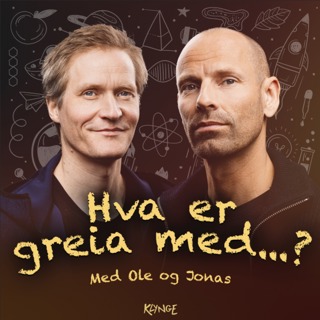
Martin Sheringer: "The Growing Threat from Chemical Pollution"
On this episode, Professor of environmental chemistry Martin Sheringer joins Nate. Together, they discuss Sheringer's most recent paper on PFAS - the 'forever chemicals, their ubiquity in waterways all over the globe, and their numerous critical health effects. More broadly, they outline the risks and scenarios of plastic pollution to planetary futures - and what we might do about it. Is it possible to live in a (mostly) plastic free world, and do we really have any other option? About Martin Sheringer Martin Scheringer is a professor of environmental chemistry at Masaryk University, Brno, Czech Republic, and works in the research program on Environmental Chemistry and Modeling at RECETOX. He holds a diploma in chemistry from the Johannes-Gutenberg University, Mainz, Germany, and a doctoral degree and a habilitation from the Swiss Federal Institute of Technology (ETH) in Zürich, Switzerland. For Show Notes and Transcript visit: https://www.thegreatsimplification.com/episode/37-martin-scheringer
21 Sep 20221h 17min

The 6th Pool..? | Frankly #8
On this segment of Frankly, Nate responds to the predicament of increased use of forests, especially in Europe, for heating fuel in the face of declining availability of Natural Gas and other fossil fuels. Will this be a 'Terminal Deforestation Event'? What does this mean for the future of climate and accuracy of models? The importance of trees cannot be underestimated as we approach the end of cheap energy. Recorded September 14, 2022 For Show Notes and Transcript visit: https://www.thegreatsimplification.com/frankly-original/frankly-08-the-6th-pool To Watch on Youtube: https://www.youtube.com/watch?v=3N-BbsXpyTM
17 Sep 202213min

Douglas Rushkoff: "The Ultimate Exit Strategy"
On this episode, Author and Professor Douglas Rushkoff joins Nate to discuss how human behavior interacts with technology and how we have arrived at a place with enormous wealth and income inequality just as society is rapidly approaching biophysical limits. Rushkoff unpacks parts of his new book, Survival of the Richest: Escape Fantasies of the Tech Billionaires, on the need to collectively break away from a top-down mindset to embrace circularity and resiliency. About Douglas Rushkoff: Named one of the "world's ten most influential intellectuals" by MIT, Douglas Rushkoff is an author and documentarian who studies human autonomy in a digital age. His twenty books include the upcoming Survival of the Richest: Escape Fantasies of the Tech Billionaires, as well as the recent Team Human, based on his podcast, and the bestsellers Present Shock, Throwing Rocks at the Google Bus, Program or Be Programmed, Life Inc, and Media Virus. He also made the PBS Frontline documentaries Generation Like, The Persuaders, and Merchants of Cool. His book Coercion won the Marshall McLuhan Award, and the Media Ecology Association honored him with the first Neil Postman Award for Career Achievement in Public Intellectual Activity. For Show Notes and Transcript visit: https://www.thegreatsimplification.com/episode/36-douglas-rushkoff
14 Sep 20221h 23min

Growth Until Not | Frankly #7
Earlier this week there was a livestream debate highlighting the key points of the Green Growth and DeGrowth perspectives - this week's Frankly adds a 3rd 'growth critical' perspective - that modern society has a metabolism and momentum and will grow - in non-green ways - until we can't. This is a critical third category that should be included in these discussions, despite its 'tougher sell'. For Show Notes and Transcript visit: https://www.thegreatsimplification.com/frankly-original/frankly-07-growth-until-not To Watch on Youtube: https://www.youtube.com/watch?v=0vuCJkI8B2M
9 Sep 202222min

Steve Vavrus: "Arctic Fever? Taking the Arctic's Temperature"
On this episode, Climate Scientist Steve Vavrus joins Nate to discuss the Arctic and its critical impact on climate science. Why are the effects of warming so extreme in the Arctic, and what are the implications for weather events and average temperatures on the rest of the planet? Do runaway arctic feedback loops mean disaster 'Blue Ocean' scenarios? Steve explains why the answers to these questions aren't as simple as they may seem and talks about the challenges and hopes he sees for the future of humans and global climate. About Steve Vavrus: Steve Vavrus is a Senior Scientist in the Nelson Institute Center for Climatic Research at the University of Wisconsin-Madison. He uses computer climate models and observational data to understand how our climate is changing across the world, including in Wisconsin. Extreme weather events are an important theme of his research, particularly how they might be affected by climate change. Steve is co-director of the Wisconsin Initiative on Climate Change Impacts (WICCI) and has been a long-time member of its Climate Working Group. Steve received Ph.D. and Master's degrees in meteorology at the University of Wisconsin and a Bachelor's degree in meteorology at Purdue University. For Show Notes and Transcript visit: https://www.thegreatsimplification.com/episode/35-steve-vavrus
7 Sep 202259min

Kiril Sokoloff: "What's the Most Important Question in Today's World?"
On this episode, we meet with legendary financial icon Kiril Sokoloff to take a bird's eye view of the global energy/financial situation. Why is the financial community so complacent about peak oil and the relationship between increasing energy scale and growth? Can we make predictions about the future by looking back at history? Kiril shares his professional experiences with scenario planning, disruption, and investing as well as his passion for history and the practice of Buddhism to influence and inform decision making and life. About Kiril Sokoloff: Kiril is an investor, a researcher, and long-time editor of the highly respected weekly publication "13D – What I Learned this Week". For 50 years he has predicted major inflection points in energy and commodity prices correctly including 1980, 2002, and 2008 and recently stated sanctions on Russia will result in economic suicide for Europe. Kiril is active in philanthropy in areas of healthcare, education, and the scaling of human consciousness. For Show Notes and Transcript visit: https://www.thegreatsimplification.com/episode/34-kiril-sokoloff
31 Aug 20221h 18min

The End Of Abundance | Frankly #6
On this segment of Frankly, Nate opines on the significance of French President Macron's statement we are nearing the "end of an era of abundance'. Nate shares what this watershed moment in the global political narrative means for Europe, the U.S. and the world - as we rapidly become less "energy-blind". For Show Notes and Transcript visit: https://www.thegreatsimplification.com/frankly-original/frankly-06-the-end-of-abundance To Watch on Youtube: https://www.youtube.com/watch?v=l5NuN0rqV6s
30 Aug 20229min

Kris De Decker: "Low Tech: What, Why and How"
On this episode, we meet with inventor, researcher and author Kris De Decker to understand the concept of "low tech" and its relevance in a high tech society and growth-driven economy. How does low tech differ from high tech and what does it feel like to live a low tech lifestyle? Why do we assume high tech will always be the solution, and could low tech be a feasible path for a sustainable and fulfilling future? De Decker shares his personal experiences as a low tech advocate and researcher in a high tech urban environment and how freedom from technology provides both challenges and unexpected benefits. About Kris De Decker: Kris De Decker shifted from a journalism career covering high tech to exploring low tech through formal and personal research and projects, including the Human Power Plant and the Solar Powered Website. De Decker is creator and author of Low Tech Magazine and No Tech Magazine, publications which explore low tech solutions to questions society assumes must be solved through high tech. De Decker has contributed articles about science, technology, energy and the environment to Mother Earth News, Techniques et Culture, Design Magazine, The Oil Drum, Resilience, EOS, Molenecho's, "Knack", "De Tijd" and "De Standaard". De Decker's books "Energie in 2030" advised the Dutch government on challenges related to science and technology and his book "Stralingswarmte: gezonde warmte met minder energie" provided a guide for how heat works. De Decker was born in Antwerp, Belgium and lives in Barcelona, Spain. De Decker describes himself as "rather inactive" on Twitter and LinkedIn. For Show Notes and Transcript visit: https://www.thegreatsimplification.com/episodes
24 Aug 20221h 7min




















